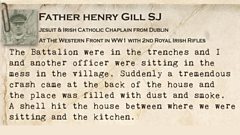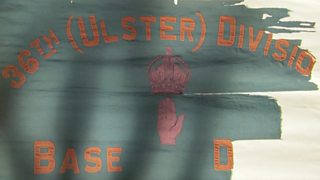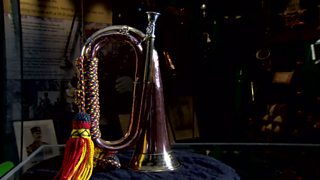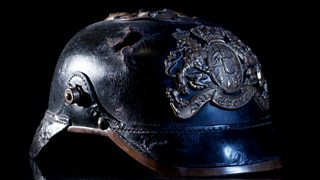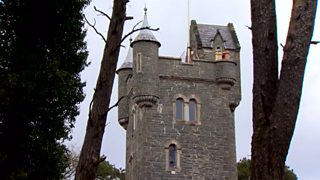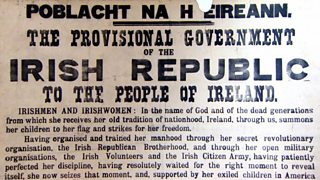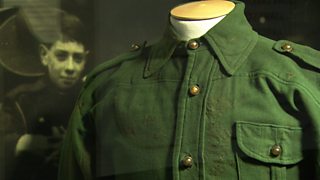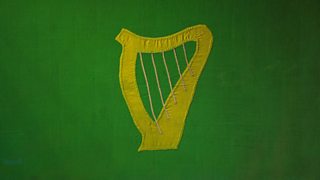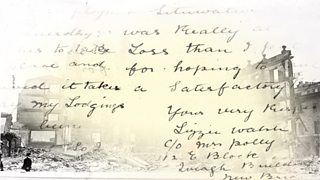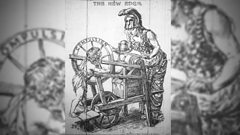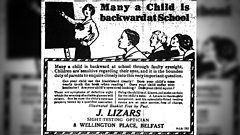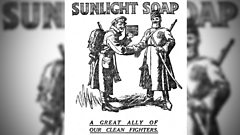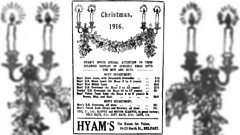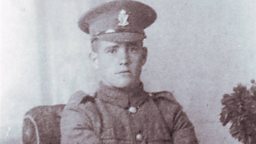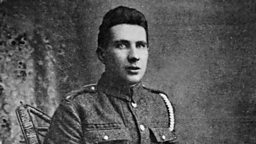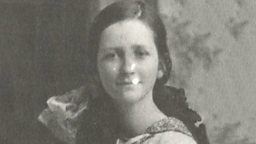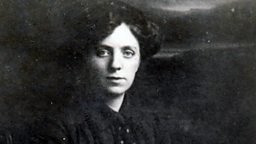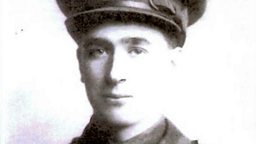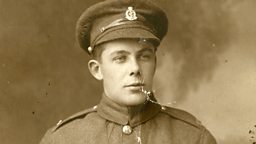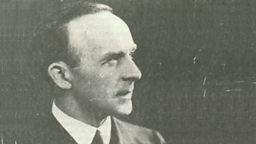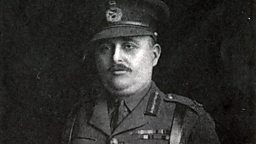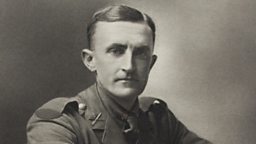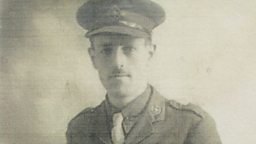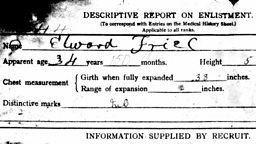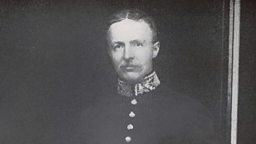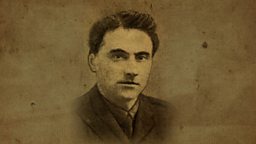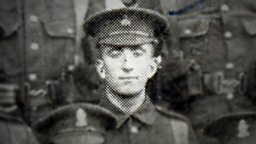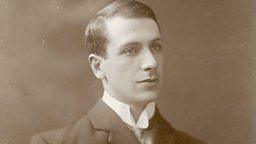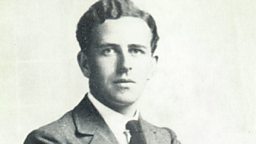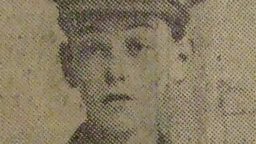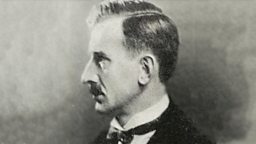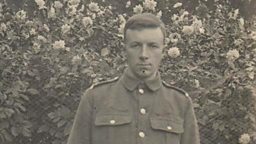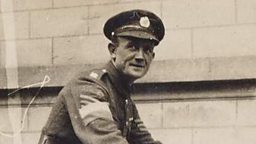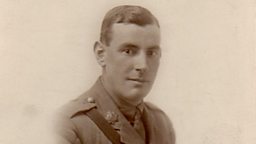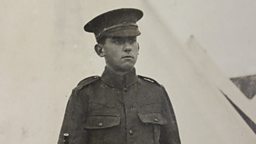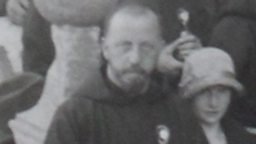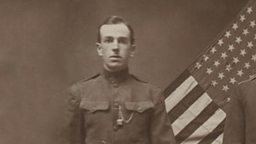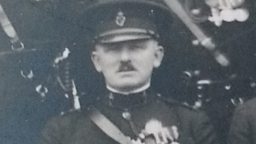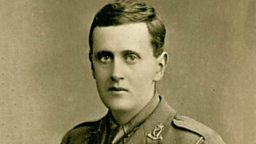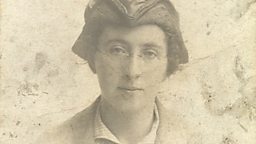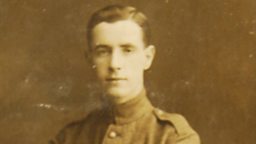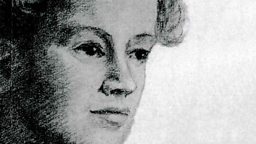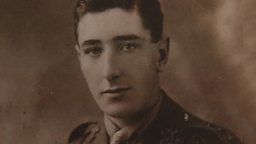Father Henry Gill
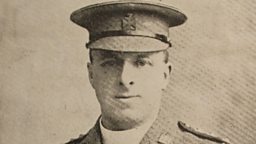
Catholic chaplain to the forces
Henry Gill was born on 8 July 1872. His father was Henry J Gill, owner of the printing and publishing company MH Gill & Son and an Irish MP who was strongly in favour of Βι¶ΉΤΌΕΔ Rule.
One does not get used to men being killed
After studying at Clongowes Wood College in Kildare, Henry did not go into the family business or enter politics but instead pursued a career as a Jesuit priest.
Gaining entry to the Society of Jesus in December 1889, Henry began his novitiate at St Stanislaus College, Tullamore, in April 1890.
After two years in Tullamore, Henry continued his training and preparation in Milltown Park, teaching there while also attending lectures in mathematics and science at University College Dublin.
Love of Louvain
In 1895, Henry traveled to Belgium to fulfill his compulsory study of philosophy at the University of Louvain, forming a strong attachment to the city.
He returned to Ireland three years later to teach in the Jesuit colleges of Limerick, Clongowes and Belvedere.
Ordination and Cambridge
Henry went back to Milltown Park in 1903 to study theology and was subsequently ordained there by the Archbishop of Dublin.
In 1908, he went to Cambridge University's Cavendish Laboratory to study under the tutelage of the Nobel Prize winning physicist, Professor J J Thomson.
Spiritual Father
Father Gill returned to Dublin in 1910 to resume teaching at Belvedere College, before becoming the first Spiritual Father at Rathfarnham Castle.
Within a fortnight of the outbreak of war in August 1914, he offered his services as a chaplain to the Army.
Belgian brotherhood
While Father Gill's motivation for offering his services are not certain (the Catholic hierarchy in Ireland was at the time calling for more chaplains at the front), he was unquestionably deeply affected by the German destruction of Louvain.
"Louvain is destroyed - destroyed by an act of ruthless soldiery. Could any cause, could any excuse, we ask ourselves, justify such a deed?"
"...we are proud to stand by the side of Belgium in her struggle against an unjust aggression which Ireland can but too well sympathise with."
Father at the front
Father Gill was appointed to the regular 2nd Irish Rifles - a battalion made up largely of Catholic recruits, many hailing from the north-east of Ireland.
He went to the front in November 1914 and would remain there for over 1300 days.
World War One
A Chaplain's work
What Fr Gill witnessed during the war bore little resemblance to his life before he landed in France. "... I had, of course, no experience whatever of the kind of work I had before me."
He later wrote in his memoirs that he "... was always sent for at any hour of the night when a man seemed to be in danger of death ... On many occasions I accompanied Medical Officers on their rounds to collect the wounded at the various Regimental Aid Posts ... I have often given the last Sacraments to men in these places. The whole surroundings were uncanny. The dark road ran parallel to the trenches; bullets constantly whistled past. Not a light could be seen ..."
"During war one's nerves are sorely tried, and it is only by the strictest self control and the absolute shutting out of all that concerns the sentimental and pathetic side of the surroundings that it is possible to keep going on. (I have no doubt that this constant strain, accompanied by the necessary suppression must leave its mark for many years after)."
Visit from Redmond
"Friday. Nov. 19. Mass at 7.30. The event of the day was an inspection by Mr J Redmond. He arrived about 3.0 pm with Div General Doran, and his son and private secretary. He made a speech to the men."
"He was glad to meet a regiment which contained men of every creed from different places in Ireland, especially the North. They were now brothers in arms and he was sure their harmony and unity in the great cause in which they were fighting was a happy omen of the relations which would exist between all in Ireland after the war."
1916 opens ominously
The tumultuous year of 1916 began in dramatic fashion for Fr Gill, as he described in a letter written on 4 January.
"Yesterday I came down from the front trenches just yards from the Germans, when all was fairly quiet, except for shells passing over, and found the village where we 'rest' being shelled. Several men killed and many wounded just as I arrived. One does not get used to men being killed close by."
Easter Rising
News from Ireland over Easter reached those fighting in France. In a letter to his Fr Provincial on 3 May, in the wake of the surrender of the rebels on 30 April, Fr Gill wrote:
"We cannot think of anything else than the terrible things which have been going on in Dublin. Please God it is over now and that the authorities will use – as I am sure they will – tact in dealing with it. We only see the accounts in English, and French, newspapers. I hope none of our people have suffered in the affair. Nothing has affected Irishmen out here more than this."
Writing on 24 June, as more information had filtered through to those on the front lines of World War One, he wrote:
"I do hope things in Ireland will soon settle down. I think everyone must admit – no matter what their sympathies – that 'England has asked for trouble'. The thing which annoys me is the suggestion that we out here are unpatriotic."
The Somme
1 July
As the Battle of the Somme began on 1 July 1916, the plan had been for Fr Gill's regiment to followed the 36th (Ulster) Division once they had helped break through the German defences.
"Evidently something had gone wrong ... We were originally to have followed on after the Ulster Division, and then to have gone through them to our objective which was Courcelette. But that Division apparently through no fault of their own failed to take the position of Thiepval ..."
Move to the frontline
Even behind the lines, the situation was fraught with danger. On 3 July, the 2nd RIR lost another of their priests, Fr O'Sullivan, in a shelling. Fr Gill was unable to attend his colleague's internment. "We were in the thick of an attack when the funeral took place."
It was only a few days later that Fr Gill's turn in the frontline trenches came, on 6 July 1916.
"As we approached the line the roar of the guns became louder, and our own guns made the horses start as they fired on all sides of us."
The 'ordinary horrors' of war
"It would be impossible to detail the particulars of the many attacks which took place during the following days. We pushed on the line by the aid of bombs, bayonets and artillery several kilometres, captured many Germans, and killed many more. There was little or no sleep for anyone that night. The next day it began to rain. Soon the ordinary horrors of this kind of fighting were augmented by the indescribable mud and squalor which torrents of rain produced in the trenches."
"It was necessary to harden one's heart. Many of these poor wounded fellows had to lie in the bottom of the main trench for hours in the rain and mud, with a waterproof sheet thrown over them."
"Further up the trenches which had just been won from the enemy other sights were to be seen. Many German dead lay in the trenches in every position, and amongst many of our own."
"Towards the end of this tour in the trenches the heavy rain stopped and the mud gradually dried up. The Somme mud is white chalk, and in the process of drying became a thick putty which made walking very fatiguing. When the Battalion came back to rest for a few days at Senlis there were only half the original number that went into the trenches."
After the Somme
A great strain
The last months of the Battle of the Somme were not quite so dramatic for Fr Gill. Although his regiment "were rushed suddenly from one position to another, and in general had a very strenuous time", they did not experience losses comparable to the first few weeks of July.
Nonetheless, in a letter to his Fr Provincial on 12 September 1916, Fr Gill made clear the toll the war was taking on him: "Of course the past two years have been a great strain, and I am really tired out body and spirit ... I find it an effort to get about – a person of 30 is more fitted for this work than one of 43-44."
Joining the 36th (Ulster) Division
Fr Gill had not been particularly enamoured with the 36th (Ulster) Division when their paths had crossed earlier in the war. In his memoirs, he wrote that "charity forbids me to narrate the memories their name inspired."
When word came in September 1917 that the depleted 2nd Royal Irish Rifles were to be transferred into the equally depleted 36th, Fr Gill described it as "bad news".
Return to Dublin
It was to be early 1919 before Fr Gill returned home to Dublin. He remained in the city for the rest of his life, continuing his role as a Jesuit priest while also resuming his teaching at Belvedere College.
Fr Henry Gill died on 27 November 1945, of liver cancer, aged 73.
These pages are based on personal testimonies and contemporaneous accounts. They reflect how people saw things at that time and are not meant to be a definitive history of the period.
The words of Father Henry Gill
Voices 16 objects
Voices 16 galleries
Credits
Father Gill's written testimony © . Image and account reproduced with kind permission of Irish Jesuit Archives, with thanks to Michael Gill.
Biographical information is taken from Father Gill - The First World War Diary of Henry Gill S.J. with kind permission of its author, .
